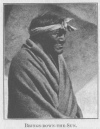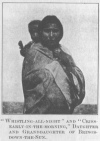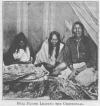
The Old North Trail, by Walter McClintock, [1910], at sacred-texts.com

The Old North Trail, by Walter McClintock, [1910], at sacred-texts.com
We dine with Brings-down-the-Sun. –Onesta introduces me to the old chief.—He declines to impart his knowledge.—Recites the wrongs which caused his mistrust of the white race.—Allows me to remain in his camp.—I meet his wife and youngest daughter.—He offers us free use of their wild berry supply.—His statesmanlike reasons for preserving their natural resources of trees and berry bushes.—First thunder of the summer is heard marking time for opening Medicine Pipes.—I meet my friend Bull Plume conducting a Pipe ceremonial.—Hospitality of Brings-down-the-Sun.—Indian children's fear of white men.—Interesting scenes along a stream.—A contented family of beavers.—A miniature camp with complete doll outfit.—Games of boys and girls.—"Wheel and arrow," a gambling game of men.—An extended sunset view from Lookout Butte.
WE found Brings-down-the-Sun reclining against his lodge-back, waiting our arrival. He directed Onesta, his nephew, to a place on his right, while Kionama and I took seats on a comfortable blanket-bed on his left. A small fire burned in the centre, and, from a hot coal, arose the fragrant smoke of dried sweet grass. Everything inside the lodge was scrupulously neat and clean. The shining cooking utensils were stored in boxes by the door. The provisions and clothing were hidden away behind the beds in bags and painted parfleches, while articles decorated with beads and coloured porcupine quills hung from the lodge poles. After a preliminary smoke and a simple meal of bread, dried meat and tea, Onesta addressed Brings-down-the-Sun:
"We have brought this white man, A-pe-ech-eken, the adopted son of Mad Wolf, a long journey under a hot sun to see you. On
our way we met Spotted Eagle and Big Smoke. We also visited the lodge of One Spot in the Kainau Camp. I have told them all that we were taking A-pe-ech-eken to the North Piegans, to learn from you about our legends and customs and that you might instruct him concerning the worship of the Sun. You are my uncle, A-pe-ech-eken is my friend, and I ask that you do this."
Brings-down-the-Sun gazed keenly into my face and then replied very earnestly: "The white race have always cheated and deceived us. They have deprived
 Click to enlarge BRINGS-DOWN-THE-SUN. |
become bitter, and I have made a vow, that I will have nothing more to do with the white race. It does not now seem to me advisable to talk further about these things, and to explain our religion to a white man. However, Onesta is my kinsman and has brought this white man a long distance. He can remain in my camp for a few days to rest, and, during that time, it is possible that we may grow to know each other better." At this moment Bird, the
 Click to enlarge “WHISTLING-ALL-NIGHT” AND “CRIES-EARLY-IN-THE-MORNING,” DAUGHTER AND GRANDDAUGHTER OF BRINGS-DOWN-THE-SUN. |
the branches of the berry bushes. I make this request, because I am looking ahead for my tribe. I am anxious to preserve these big trees and the berry bushes for our children. I am accustomed to admonish my people, in this manlier, warning them not to be short-sighted like the Bloods. They once had many large trees along their river, but they cut them down for firewood. Now their country is bare and they have few berries. I am continually advising my people not to cut down the trees along the river, but to haul their wood from the forests on the mountains. They have followed my advice and we still have our big leaf trees (cottonwoods). The long leaved trees are the spear-leaf trees (Balsam-Poplar). We also have round-leaf trees (Quaking-Asps) and brush-sticks (Willows). We always speak of large trees as 'The Old Time Trees' and the small ones as 'Young People's Trees.'" When leaving, I presented the chief with a large silk handkerchief, his wife with a blanket, while the daughter, Whistling-all-night, showed great delight, when I gave her a set of pearl buttons.
The first night of our arrival in Brings-down-the-Sun's camp, I spread my blankets beneath a large cottonwood tree. Although I was very tired after our long ride in the hot sun, and from assisting in the laborious work of making a permanent camp, caring for the horses, unloading the wagons, cutting the lodge poles and firewood, pitching the tipis and starting the fires, I was too restless to sleep. The night was unusually warm and sultry. Heavy clouds had gathered over the Rockies and extended over the plains, bursting upon us, during the night, with wind, lightning and crashing peals of thunder.
Next morning, Onesta said that it was the first
thunder heard by the Piegans. In Montana it had thundered earlier and the South Piegans had already brought out their Medicine Pipes, but the North Piegans had been waiting, and now they must give the ceremonial of unrolling their Pipes and renewing the tobacco in their sacred bundles. A messenger came into camp, announcing that Running Antelope would

Click to enlarge
BULL PLUME LEADING THE CEREMONIAL.
open his Medicine Pipe and invited us all to the ceremonial. Onesta, Nitana, Bird and Long Hair were going, so I accompanied them several miles up the river to Running Antelope's camp. When we entered the lodge, the ceremonial had already begun. To my surprise, I saw that the leader was Bull Plume, the chief, whom I had met when visiting Mad Wolf. He was so astonished at my unexpected appearance, that the rattles fell from his hands, and he stopped in the
middle of a chant. When he had recovered himself, he shook my hand, telling the assembled people my Indian name, and explaining that I was the adopted son of Mad Wolf. Bull Plume then turned to me and said: "I can tell you how many moons have passed, since I last met you in Mad Wolf s lodge, for I have kept count and have marked the moons in my records." He handed me a pair of rattles, requesting me to join in the chant and take part in the ceremonial. After a number of dances, followed by a feast, the Medicine Pipe was opened and held up. Fresh tobacco was also inserted in the Bundle, in place of the old, which was distributed among the people. When the Medicine Pipe ceremonial was finished, Running Antelope's wife availed herself of the opportunity to open a Medicine Bonnet, in fulfilment of a vow made by her son. During the winter, when he was very sick, he made a vow to the Sun, that, if he recovered, his mother who had given the Sun-dance and owned a Medicine Bonnet, would give a ceremonial. The boy recovered, and the mother was now fulfilling his promise.
On this same day, Brings-down-the-Sun drove thirty miles across the plains, under a burning sun, that he might secure, from the nearest trading store, provisions for his visitors. He took with him Mysterious Woman, his young daughter-in-law, and Sinopa, the daughter of Menake. When they returned, Brings-down-the-Sun carried all of his purchases (five loaves of bread and some fresh meat) to our camp, at the same time offering apologies that he had so little to offer. He said: "Some people may think me foolish for taking two young women with me, but I thought they would be pleased at seeing the strange sights of the town." Sinopa afterwards told her mother that, when they reached town
[paragraph continues] (Macleod, Canada) the old chief took them to a restaurant and ordered a fine turkey dinner for them. While they were eating, he visited the bakers to buy bread, and hunted for a good store to secure the best meat. Before they started home he gave Mysterious Woman five cents with which to buy candy, remarking that "it was not well to spend more for sweet stuff."
When I walked through the wood to explore the trails, I noticed groups of children slyly peeping through the trees to get a look at the "strange white man." They had been taught from infancy that white men are dangerous monsters, for whenever I came near, they quickly disappeared like frightened deer, but I gradually overcame their instinctive dread; at first by seeming to ignore their presence, and finally gaining their confidence, by small presents and bribes of candy. I investigated the spring pointed out by Brings-down-the-Sun for our water supply. It proved to be the still-water of a very beautiful stream. Along its shady banks, I found delicious wild strawberries, choke cherries and sarvis berry bushes, growing high above my head and laden down with ripe fruit. In the wood, were great numbers of beautiful song birds. I recognised the yellowthroat, cat bird, whitethroat, goldfinch, white crowned sparrow and many varieties of warblers. In a grove of cottonwoods, beside the river, I discovered the fresh tracks of a family of beavers. There were tiny footprints of the children in the soft mud and the large tracks of old beavers. I saw their recent cuttings and also weather-beaten stumps of trees felled by them, many years ago. When I spoke to Onesta of my find, he said; "Some beavers, like many people, never seem to be satisfied and are continually travelling, but this family, you speak of, have lived here undisturbed for
many years. They have a sandy beach and a mud bottom, with plenty of food, and are contented with their home."
Following a trail, leading past Brings-down-the-Sun's tipi, and crossing the stream near the deep pool, where every day the old chief and his entire family took their early morning plunge, I met Long Hair coming from the stream with a bucket of water. Nitana sat nearby upon a grassy bank washing Yellow Mink. It was a beautiful spot. In the mirror-like stillwater were perfect reflections of the arching trees, the tipis close to the shore, and the blue smoke floating from their tops. The children and young people had congregated along the banks, to wade and swim and play their primitive games. I saw a young girl poling a raft. She looked very picturesque in her squaw dress, with hair hanging in long braids over her shoulders. She wore white shell earrings, a braided health-charm fastened in her front hair, and a long necklace of dried sarvis berries. When the craft finally grounded upon a large rock in midstream, I felt like going to her assistance but, realising that it would only subject her to the gossip of the camp, I remained at a distance, and contented myself with taking her picture.
In an open glade was a miniature encampment, where a group of little girls were playing. They had men and women-dolls dressed in buck-skin, and cloth costumes, with real human hair and leggings and beaded belts and moccasins. There were gopher skins for robes, little knife-sheaths, tanning-tools and baby-cases. In the centre of the camp circle of miniature tipis, they had the largest tipi with long poles, for the head chief, also small lodge backs, painted parfleches and a diminutive medicine case, hanging from a tripod.
A boisterous game was being played by lively boys and girls. The game was similar to our 'catcher,' in which all endeavoured to avoid the touch of one of their number, at whom they sang derisively, "Ape-koi-ya-soma-tia-kake-kina" (You are a mangey old skunk with no hair along your backbone). 1
The young girls played a game called, "Throwing

Click to enlarge
CHILD'S PLAY TIPI.
willow arrows." They used a large arrow with a string of plaited horse-hair attached to one end. The first in turn threw it into a bush. If the second thrower could hit the larger arrow with a smaller one, or even touch the horse hair, she won an arrow from the first player. But, if she missed, and the first player in turn threw a
small arrow touching the second arrow, the latter became the winner. The girls also had a game of "hiding bones," made of antelope bones, beautifully carved and decorated. The boys had another curious and amusing game. They sat in two long rows. One of the players, with his eyes closed, walked back and forth between them, each side trying to confuse him, by calling to him to go this way, or that. If he came too close and touched one of the players with his foot, that boy jumped up, and taking him upon his back, held him by the legs with his head hanging down. All then rose and, taking hold, swung him round and round. If he called out the name of a girl, saying: "She is my sweetheart," they stopped, but, if he was ashamed to do so, they kept swinging him until they were tired out. If the boy lacked nerve to endure the swinging, he acknowledged it by spitting and they dropped him at once.
The boys had a bow-and-arrow game. A stake arrow was driven into the ground and they shot in turn, each trying to hit the stake, or come as near as possible. If the first player shot so close, that the second in turn thought he would have difficulty in beating it, he walked up to the stake arrow and danced beside it, to secure "power" for shooting, beating time with an arrow upon his bow while singing, "I am going to hit it first." If the second player shot well also, the third danced, seeking for even greater skill, singing, "No, I am the one, who will hit the stake arrow first."
There was also the "wheel and arrow," a gambling game played by men with arrows and a small wheel with beaded spokes. The wheel was rolled over a smooth and level course, each player throwing an arrow at it. The points were counted according to the position of the arrows when the wheel stopped. Its origin is very
ancient and it is often mentioned in old stories and legends. Its use as a gambling game was very general among the plains-tribes.
Passing from these interesting scenes of camp life, I climbed the steep ascent of "Lookout Butte," which Onesta told me had been used for many generations by Brings-down-the-Sun and his ancestors, as a place of meditation and prayer. A wonderful prospect was spread out in every
 Click to enlarge WHEEL AND ARROW GAME. |
Seated in this ancestral place of meditation, and under the spell of my peaceful and beautiful surroundings,
a strong doubt entered my mind as to whether the white races, in the pride of their civilisation, fit their natural environments much better than this patriarchal settlement of Blackfeet.
While we have mastered and harnessed the forces of nature to do our bidding, and have achieved wonderful things in science and industrial combination, have we, with all of our striving and complex life, attained a much higher average of character, contentment and loyalty to the community interests, than was attained under the simple life and few wants of the average Blackfoot family, before the invasion of the white race? We could look in vain in such camps as that of the North Piegans, nestled among the cottonwoods, to find the depravity, misery and consuming vice, which involve multitudes in the industrial centres of all the large cities of Christendom.